Minister Claims FIFA President’s Visit To Iran Not Related To Ban On Women
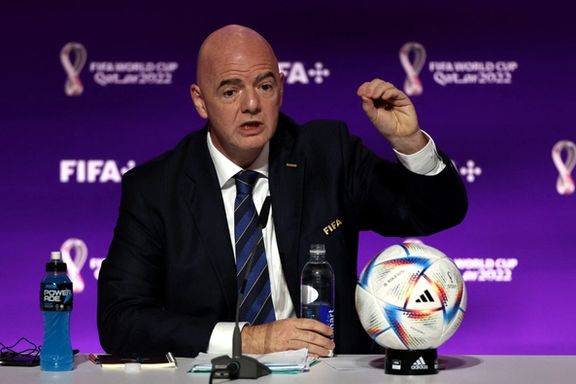
Iran’s minister of sports says that the FIFA President Gianni Infantino's visit to Tehran is not about the ban on women entering stadiums to watch matches.

Iran’s minister of sports says that the FIFA President Gianni Infantino's visit to Tehran is not about the ban on women entering stadiums to watch matches.
Earlier, the president of Iran’s Football Federation Mehdi Taj announced that Infantino will visit Iran soon. However, some speculated that his trip is to follow up on the issue of the ban.
Sports minister Hamid Sajjadi claimed on Tuesday that “the issue of women's presence in stadiums has been resolved and women will “proudly” enter the sports complexes to watch games in the future.
His claim comes as recently police used violence to bar a group of female fans of Esteghlal and Persepolis soccer clubs to prevent them from entering the Azadi stadium in Tehran .
The international governing body of the football association (FIFA) has tried to convince Iran’s government to lift the unwritten four-decade-old ban on women attending stadiums to watch male players.
However, the Iranian federation as well as security and law enforcement agencies are not following FIFA's directive under the pretext of lack of infrastructure to keep women in separate sections, apart from male spectators.
On some occasions when a limited number of women have been allowed in stadiums, they were placed in separate sections, not mixing with men but the ban has subsequently led to many arrests, beatings, detentions, and assaults against women.
This restriction is based on the country’s strict Islamic laws. Iranian officials have always argued that male football fans swear profanities, so the atmosphere of stadiums is not suitable for women even if they are seated in a separate sections.
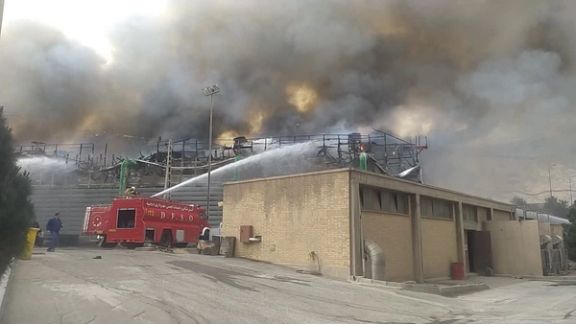
Media in Iran reported Tuesday that a large fire broke out at a power plant west of the Iranian city Esfahan (Isfahan) and was extinguished within a few hours.
"This afternoon, fire broke out in one of the cooling towers of the Isfahan power plant. The fire was extinguished thanks to the rapid response of relief forces and there were no injuries," the director general of crisis management of the Isfahan governorate told state media.
Several unconfirmed sources reported hearing an explosion at the power plant, claiming that it was a result of drone attacks, but official sources have not announced any blast.
According to local media, the fire was so huge that all the heavy fire engines available in the region were dispatched to the plant. About 30 teams from Esfahan and nearby cities were reportedly deployed to the scene and by evening the fire was only 80 percent out.
The Esfahan thermal power plant – also known as Shahid Abbaspour – in Dorcheh near the central city of Esfahan has five units with a total generation capacity of 830 Megawatts. The cooling tower that caught fire is linked to a power unit with a maximum output of 320 MW.
No casualties or damage has been reported so far. The cause of the incident is yet to be announced following an investigation.
There have been a number of explosions and fires near Iran’s military, nuclear and industrial facilities in recent years.
On January 28, a huge fire erupted at an Iranian military industry factory following a suspected drone strike in Esfahan. Iran blamed Israel for the drone attack, vowing revenge.
On the same day, another large blaze also engulfed an industrial area near the city of Tabriz, northwest Iran. The government said the fire started at a refinery producing motor oil.
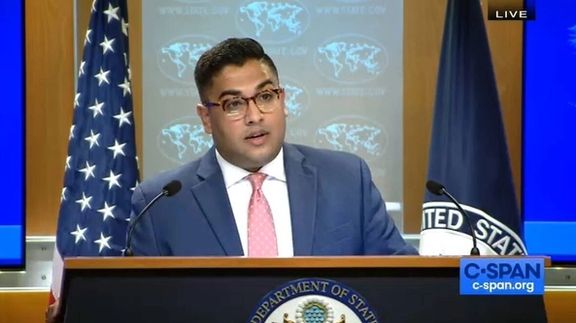
Washington has criticized the recent wave of executions in Iran saying it is a reminder of the regime’s “penchant” for human rights abuses.
“We condemn these executions....The United States will continue to take appropriate action in accordance with our allies and partners to continue to hold the Iranian regime accountable for its egregious human rights abuses,” said State Department Deputy Spokesperson Vedant Patel on Monday.
Two Iranian men were executed on Monday for "blasphemy." They were accused of making remarks on a Telegram channel called "Critique of Superstition and Religion."
Yousef Mehrad and Sadrollah Fazeli-Zare' were hanged following the execution of an Iranian-Swedish national with dual citizenship, Habib Farajollah Chaab, who was executed on Saturday.
“The US does not hesitate to take action when it comes to this, specifically targeting some of the human rights atrocities that we have seen take place from the regime in Tehran,” underlined Patel.
There have been relatively few hangings of people convicted of blasphemy in recent years, though the Iranian law permits execution for such offenses.
A report by Amnesty International has found that Iran annually executes more people than any other country except China.
According to Norway-based Iran Human Rights (IHR), in 2022, the Islamic Republic executed 582 people, the highest number since 2015. IHR also reports that 208 people have been executed to date in 2023.
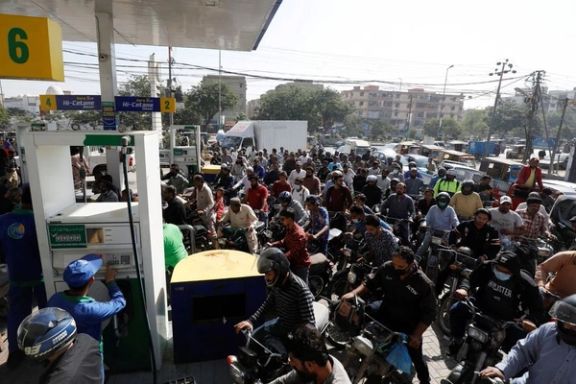
Dealers have flagged a surge in the smuggling of Iranian fuel to Pakistan, saying that up to 35% of diesel sold in the country has arrived illegally from Iran.
This can be a significant new way for Iran to go around US sanctions and sell fuel to replenish its dwindling financial resources. Pakistan consumed around 3 million metric tons of diesel in 2022, which could mean Iran could supply at least around four hundred million dollars’ worth of fuel in one year.
The Pakistan Petroleum Dealers Association (PPDA) told Reuters that in the past, the smuggling of fuel was limited to the Pakistani province of Balochistan, but that it has now spread to the rest of the country.
In April, Pakistan's energy ministry asked security forces to clamp down on fuel smuggling from Iran, according to an official memo seen by Reuters. The memo said diesel sales have slumped “more than 40%" due to smuggled products.
Pakistan mostly meets its demand for fuel from the Middle East, but it is also smuggled in through its western border with Iran.
Iran has been clamping down on small-time smugglers from its Baluch-populated region into Pakistan, but the new surge might be beyond what individuals would be able to carry across the border.
In fact, there has been evidence for years that Iran’s Revolutionary Guard (IRGC) has been smuggling fuel in the Persian Gulf waters. The regime’s main military and intelligence arm is given large consignments of crude oil and oil products to sell abroad, circumventing US sanctions.
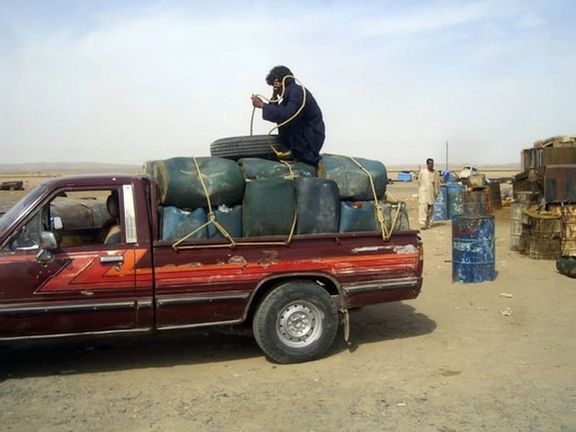
The country is facing an acute balance of payment crisis with barely enough foreign exchange reserves to cover a month’s imports. Pakistan is undertaking several measures, including raising fuel prices, to unlock a $1.1 billion tranche of aid from the International Monetary Fund.
Fuel prices have jumped 143 rupees ($0.5046), or nearly 100%, in the last 12 months. Inflation stands at a record high of 36.4% for April, significantly diminishing purchasing power for individuals and companies.
The country’s oil product sales have dropped 46% to 8.8 million barrels in April compared to last year, according to the Oil Companies Advisory Council in Pakistan. A breakdown shows diesel sales have slumped 50% year on year. This excludes smuggled fuel, which can explain the large reduction.
According to an S&P Global Commodity Insights report, Iranian fuel is around 53 rupees cheaper than the official retail price per liter.
“Private dealers have been able to make decent profits by selling Iranian diesel rupees 35 ($0.1235)/liter cheaper than local dealers,” it added.
The energy ministry said that according to the Oil & Gas Regulatory Authority (OGRA), around 4,000 tons per day of fuel smuggled into Pakistan was causing a total revenue loss of around 10.2 billion rupees a month.
The PPDA said that Iranian fuel smuggled into Pakistan was further hurting the industry, already reeling from low sales.
“I think they're [government] allowing Iranian oil to be smuggled into the country because there's an FX shortage,” Abdul Sami Khan, chairman PPDA told Reuters.
With reporting by Reuters

An Iranian-American playwright has won the prestigious Pulitzer Prize 2023 for drama.
Sanaz Toossi won this year's Pulitzer Prize for Drama, which includes a $15,000 prize, for English, a drama about linguistic and cultural misunderstandings.
The Pulitzer described Toossi’s play as “a quietly powerful play about four Iranian adults preparing for an English-language exam in a storefront school near Tehran, where family separations and travel restrictions drive them to learn a new language that may alter their identities and also represent a new life.”
In addition to their frankness and humor, Toossi's plays are renowned for capturing the voices of their characters, particularly women.
Toossi’s play also won the Steinberg Playwright Award and the Laurents/Hatcher Foundation Award in 2020.
Sanaz Toossi is an Iranian-American playwright from Orange County, California. Her plays include the critically acclaimed, award-winning English and Wish You Were Here.
The Pulitzer Prize is an award administered by Columbia University for achievements in newspaper, magazine, online journalism, literature, and musical composition within the United States.
It was established in 1917 by provisions in the will of Joseph Pulitzer, who had made his fortune as a newspaper publisher.
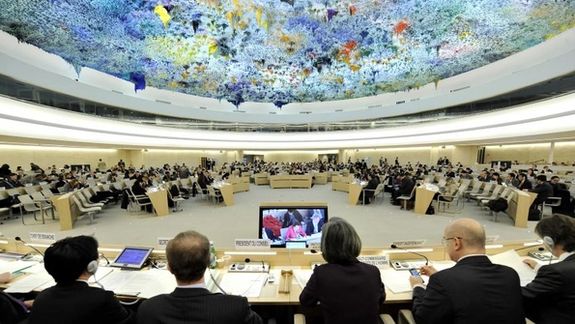
The United Nations says Iran has executed 209 people so far this year, calling the record "abominable".
Ravina Shamdasani, a spokesperson for the UN human rights office, made the remarks during a press briefing in Geneva on Tuesday.
She said that UN Human Rights chief Volker Türk had expressed dismay at the frighteningly high number of executions this year.
"On average so far this year, over 10 people are put to death each week in Iran, making it one of the world's highest executors,” she said.
“This is an abominable record, particularly when you consider the growing consensus for universal abolition of the death penalty.”
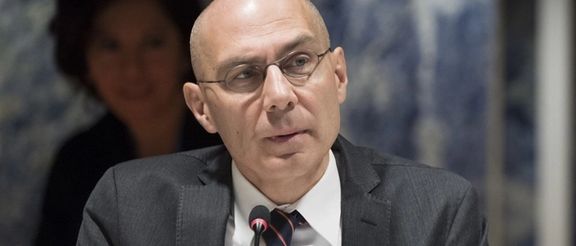
Two Iranians jailed for insulting religious entities were hanged on Monday, strengthening speculations that the Islamic Republic has embarked on a killing spree to intimidate people against further protests.Moreover, Iran executed Iranian-Swedish political activist and former leader of the Arab Struggle Movement for the Liberation of Ahwaz (ASMLA) Habib Chaab (Asyud) on Saturday for “corruption on earth”.
A group of six female activists, including prominent civil activist Narges Mohammadi, Sepideh Gholian, and Golrokh Iraee, imprisoned in Tehran’s notorious Evin prison issued a statement Monday, condemning the execution spree by the regime, claiming it will not deter those fighting the region.
"The continuation and acceleration of the execution of death sentences in recent days is the government's attempt to suppress people and create fear and terror,” they said.
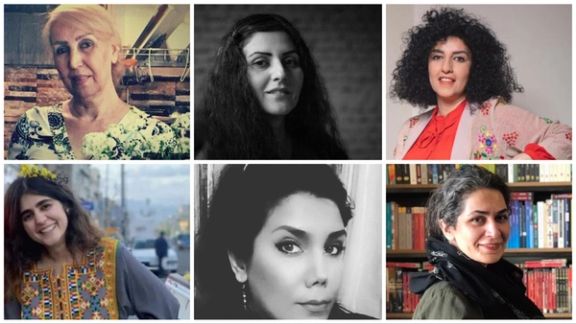
Since September, when the regime’s hijab enforcers beat to death 22-year-old Mahsa Amini, Iran has been a scene of regular rallies, the boldest since the establishment of the Islamic autocracy.
Well over 500 people, including at least 60 minors, were killed during the clashes with about 20,000 arrested. Several people were executed following trumped-up charges by the country’s judiciary.
Noting that a large number of the executions pertained to drug-related offences with a disproportionately high number representing minorities, Türk said: “Imposing the death penalty for drug offences is incompatible with international human rights norms and standards.”
According to Haalvsh website, a local news outlet that monitors rights violations in Iran's Baluchestan region, at least 26 members of the Baluch minority have been hanged in the past nine days, reflecting the renewed vigor with which the regime is targeting the notoriously anti-regime minority.
Iran has always been among the top countries in terms of the number of capital punishment. Recently, however, the government has intensified its reign of terror with expedited procedures for executions, which are growing exponentially.
Right groups have described the promptness of the regime’s executions of Baluch prisoners in recent weeks as “an official policy to intimidate protesters in Sistan and Baluchistan province.”As Sunni Muslims, Baluch citizens are both an ethnic and religious minority. Estimates of the Iranian Baluch population range from 1.5 to 2 million people.
The Baluch community – along with the Kurds -- has always been among the most persecuted minorities of Iran, and has the largest number of people executed in the country. Most of the Baluchs are executed over drug-related charges, but activists say their cases do not receive due process through a fair trial and that the regime uses drug charges as a pretext to avenge 30 consecutive weeks of widespread protests after their Friday prayers.
In its Tuesday press release, the office of the high commissioner for human rights confirmed that the exact number of executions is unknown due to lack of government transparency, and the figure is likely to be higher.
“At this rate, Iran is worryingly on the same track as last year when around 580 people were reportedly executed,” Türk added. The High Commissioner also urged the Iranian authorities to establish a moratorium on executions with a view to abolishing the death penalty though as numbers soar, this looks unlikely.